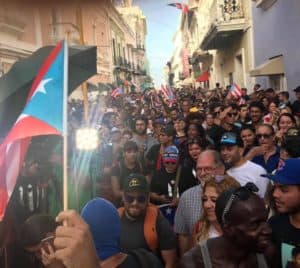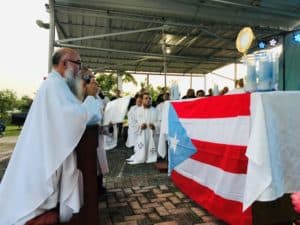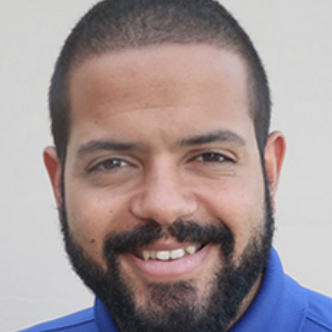A month after the protests in Puerto Rico that captivated the world, Ángel Flores shares what he lived in the picket line the day the governor resigned. He also includes a brief historical account of the events that led Puerto Ricans to take action against their government and the general response of the local Catholic Church. He then leaves us with a question: how are we mainland Catholics called to emulate this struggle for justice?
*****
July 24, Calle de La Fortaleza
I got there early. It was 3pm. The governor of Puerto Rico, Ricardo Rosselló, would supposedly resign at any minute, and I was in front of La Fortaleza, the presidential mansion, with a few dozen protesters. Standing over the police barricade with their backs to the governor’s residence, a group of poets led the crowd of demonstrators with their verses and slogans. One could be inspired by the patriotic poems, laugh at the parodic criticisms, dance to the music and give a thankful smile to the tourists who showed their solidarity. But uncertainty was also in the air. Nothing could ensure that the rumor spread the night before would become a reality: Rosselló would step down and Puerto Ricans would make history.
5pm came. Still nothing. The head of the Puerto Rican House of Representatives decided to begin the official impeachment process because the governor did not meet the agreed deadline to resign. By this time hundreds had joined the protest. There were young, old, radicals, moderates, conservatives, religious, atheists, rich, poor. When night came, we were thousands. Saucepans kept the beat, and the voice of the crowd shook the narrow streets of Old San Juan with shouts like: “¡Somos más, y no tenemos miedo!” (We are more, and we are not afraid!) and “¿Dónde está Ricky? Ricky no está aquí…Ricky está vendiendo lo que queda del país.” (Where is Ricky? Ricky is not here…Ricky is selling what is left of the Island.)
It was 9pm. Like every previous night, the police were in high gear. Instructions were given by leading protesters: “Do not throw objects at the police or become violent.” After two weeks of demonstrations, people knew that the governor was only benefitting from the few violent showdowns. A rumor about a video of the governor’s resignation had circulated. But by 10 pm, there was still nothing. We had already entered the “tear gas hour.” People prepared for the worst while the leading protesters gave instructions to the crowd from the barricade. Following classic non-violent resistance principles, they exhorted: “If the police throw tear gas, sit down and do not attack, so the real oppressors are made manifest.”

Hundreds of Puerto Ricans protest in Old San Juan in the evening of July 24, 2019, as they wait for the governor to resign (Photo by the author)
An hour later, I watched the governor’s video presenting his resignation, official on August 2. Governor Rosselló was forced out of power by peaceful protesters. Fortaleza street (renamed “Resistencia” by the protesters) immediately exploded into celebration and shouts of joy. With their creative and inclusive activism, Puerto Ricans reaffirmed their sovereignty over their government. And all without a single bullet. Perhaps this was meant to be in a city named after John the Baptist.
*****
Brief Historical Background
Ricardo Rosselló had been the governor of PR since January 2017. After Hurricane María hit in September of that same year, he received abundant criticism for being too cautious when making public demands to President Donald Trump. The United States leader had minimized the catastrophic event which produced close to 3,000 deaths, causing scandal and anger around the US and beyond. To make matters worse, 2018 began with an increase of economic austerity measures to deal with the Island’s national debt, including the decision to close hundreds of public schools around the Island and cut millions of dollars from the University of Puerto Rico’s budget, which lead to thousands of people protesting in the streets and being dispersed with tear gas. The police also discovered in September 2018 that thousands of water bottles were abandoned in a runway and not given to hurricane survivors before becoming unusable. Meanwhile, Puerto Rican families still lacked power, water, and roofs.
This past summer the situation escalated. On June 29, the secretary of the Puerto Rican Department of the Treasury, Raúl Maldonado, publicly denounced an “institutional mafia” in this office, declaring that he was cooperating with the FBI to investigate government employees. Governor Rosselló immediately dismissed the secretary. Then came the last straw. On July 9, pages of a private chat between the governor and 11 of his collaborators were published by the press. The messages in the chat contained homophobic comments about celebrities like Ricky Martin, misogynistic insults against political rivals like the mayor of San Juan, Carmen Yulín Cruz, and disrespectful language toward victims of hurricane María. One day later, six members of his government were arrested for corruption charges. But this was not enough to make the governor go. On July 11, he apologized to the Puerto Rican people for his failures but indicated that he would not resign.
The last twelve days of his leadership began on July 13, when as protests demanding his resignation grew, almost 900 pages of a Telegram chat were revealed to the public. The levels of general rage were cemented. For the next week, thousands of Puerto Ricans went to the streets, including world famous actors and artists like Benicio del Toro, Residente, and Bad Bunny, asking for the governor’s resignation. But the governor did not want to leave. Although he gave up his 2020 candidacy and renounced his position as president of his party, he held on to the governor’s office. After people from every background imaginable had protested through picket lines, horse riding, kayaking, motorcycling, bicycle riding, etc. Finally, on July 22, a 500,000 people march was made in one of the local highways. It was the biggest demonstration in Puerto Rican history to date. Two days later, Puerto Ricans started cheering in Old San Juan as the governor announced his resignation.
This victory was not orchestrated by a group of academics with degrees. It was the result of a massive mobilization of every sector in society, including the church.
*****
Invitation for Catholics in the Mainland
The July protests in Puerto Rico teach us something about democracy: democracy is not a given. Governments must be held accountable through the participation and, when necessary, the resistance of its citizens in order for democracy to survive. Catholics, as active members of society called to imitate Christ in all the dimensions of their lives, including politics, are not excluded from this process. As the Compendium of the Social Doctrine of the Catholic Church explains, democracy is not just following a set of rules but “a convinced acceptance of the values that inspire democratic procedures: the dignity of every human person, the respect of human rights, commitment to the common good…” (Compendium #407). Among these rights is the right to participation which is not limited to just voting in elections. It is understood as “a duty” and a varied “series of activities by means of which the citizen, either as an individual or in association with others, whether directly or through representation, contributes to the cultural, economic, political and social life of the civil community to which he belongs… (Compendium #189). Democracy also includes the right to resistance, exercised when the authorities “violate in a serious or repeated manner the essential principles of natural law” that give testimony to the dignity of everyone. As Saint Thomas Aquinas explains, “one is obliged to obey… insofar as it is required by the order of justice” (Compendium #400). For this reason, we must disobey the “directives of civil authorities when they are contrary to the demands of the moral order, to the fundamental rights of persons or the teachings of the Gospel” (Catechism of the Catholic Church #2242). This commitment to participate in the renovation of the local democratic system by the impulse of the Gospel, even to the point of resistance, was practiced by Catholics of all kinds in the July protests of Puerto Rico.
As events unfolded during the last month, lay people, religious women and men, priests and bishops, all marched and protested along with people of all faiths and ideologies. The Puerto Rican Conference of Catholic Bishops published three documents during the protests. The first on July 18 explained how the governor had abused his power, hurt the human dignity of diverse groups in Puerto Rican society, and therefore could not continue to exercise his leadership. The second on July 20 called for a National Day of Prayer on July 26. The third document, published on July 25, came after the governor’s resignation. The bishops offered a prayer for the future governor and invited all Puerto Ricans to collaborate in the creation of a better society. The Church members of Puerto Rico took matters into their own hands and through their participation in the struggle for justice became lumen gentium, not just in the church buildings, but also in the streets.
*****

Bishop González Medina begins the adoration of the Blessed Sacrament. (Photo by author)
The Struggle Continues
The fight is not over yet on the “Island of Enchantment”. The first substitute of Governor Rosselló lasted less than a week. Wanda Vazquez, the new governor, is under heavy public scrutiny and more arrests of political figures are expected. In the meantime, Puerto Ricans remain vigilant. Protests and creative demonstrations continue to be of public interest. From all of it, a question remains for us in the mainland: what else will we do to ensure that recent abuses to the dignity of human life cease?
Maybe it is time to imitate one of the methods used in Puerto Rico and flood Washington D.C. with tens of thousands of motorcycles to protest the deaths of immigrant children under government custody. Maybe it is time to form a common front between famous actors, artists, and musicians to call for millions of people to participate in national marches in the US capital that last for weeks. Maybe it’s time for the US Conference of Catholic Bishops to publicly and unequivocally condemn the immoral indifference of many politicians. Politicians who express little compassion for the thousands of people fleeing violence in their countries. Politicians who are influenced by gun manufacturers who prefer to let people die rather than allowing legislation that limits their profits. The bishops must also denounce the increasing bigotry and racism in presidential speeches.
Can we have a national vigil of penance and atonement for the shootings and the continuous growth of white nationalism? Can our pastors demand that a prayer of the faithful is done every week for the end of racism? Can the bishops call Catholics of all sorts to collaborate with social justice initiatives and to transform parishes in centers of social change? I am convinced that the oppressors will capitulate if, like in Puerto Rico, the church fully supports everyone in the mainland taking to the streets, for however long is necessary, in order that their government listen to them and change their policies toward immigration, racism, and gun control.
In many ways, this summer has not been an encouraging one: detention camps for immigrants at the US/Mexico Border, immigrant children separated from families and dying in detention, racist tweets and comments by the US president, and the terrible shootings in Gilroy, Dayton, and El Paso which altogether left 36 people dead. Everyone is left wondering: “When will it end?” Our torches of hope are organizations inside and outside of the Catholic Church that are actively fighting these injustices. Those like Annunciation House in El Paso, the Inter-Faith Committee on Latin America (IFCLA) in Saint Louis, the Ignatian Solidarity Network, the Jesuit Social Research Institute in New Orleans, and thousands of other initiatives and individuals, from every faith and ideology, who have joined “la lucha”. We can also find hope in the seventy Catholics arrested in DC for protesting US border policy on July 18.
I pray that, like them, every Catholic in the US soon realizes that our social sins will end when we allow our prayers to turn into action. When we resist injustice and participate in the creation of the “civilization of love,” as Paul VI and John Paul II called it, along with our sisters and brothers from other faiths and creeds. When all of us imitate the citizens of Puerto Rico and take matters into our own hands. Even if it takes civil disobedience, we must demand our politicians to act according to solidarity instead of individualism. We must fully embrace what JPII called a spirituality of communion, one that knows “how to ‘make room’ for our brothers and sisters, bearing ‘each other’s burdens’ (Gal 6:2) and resisting the selfish temptations which constantly beset us and provoke competition, careerism, distrust, and jealousy”. We cannot act in isolation, drowning in the defensive trenches of ideological dogmatism and sectarian purism. We must unite and collaborate with those who share a passion for the common good and a willingness to make it happen.
I also pray that every one of my Jesuit brothers in the US joins in, remembering what our Complementary Norms say: “The service of faith and the promotion of justice constitute one and the same mission…” and they “cannot, therefore be separated…”

Ángel Flores Fontánez, SJ and Flavio Bravo, SJ (Jesuit superior in Puerto Rico) participate in the July 24 protest in front of La Fortaleza. (Photo by the author)
In the midst of our most recent crisis, Puerto Ricans and the millions of Christians there have provided us with a method of resistance and participation to overcome corruption and to hold democracy accountable. They have been a bright light in a world which desperately needs it. Similarly, in the struggle to build a more just US, the brave women and men assisting the immigrants, promoting anti-racism, denouncing attacks to human dignity, and advocating in favor of the most vulnerable, show us the way to our own objective. It is our Catholic duty to imitate them and stand with and for the poor. It is our vocation to participate in the political transformation of this country into a more Christ-like society. Let us stop treating our neighbors as competitors. Let us resist any discourse or rhetoric that intends to restore isolationism and a false sense of national superiority.
With those women and men in the trenches of solidarity and inclusivism, let us say like Pedro Arrupe, SJ: “I do not resign myself to let the world continue after my death as if I would have never lived.”


